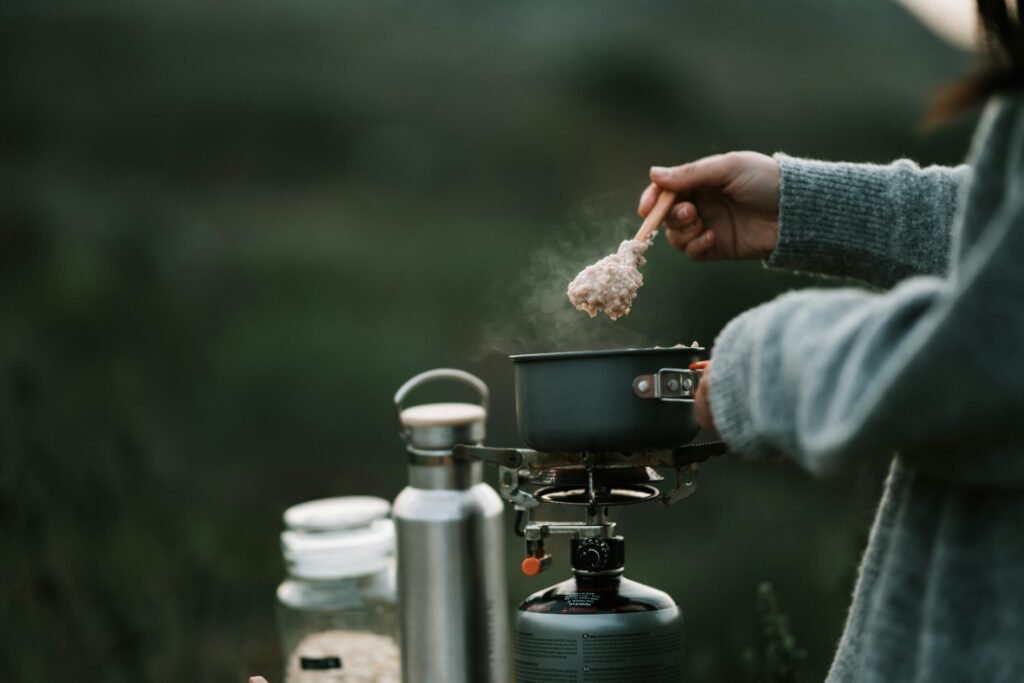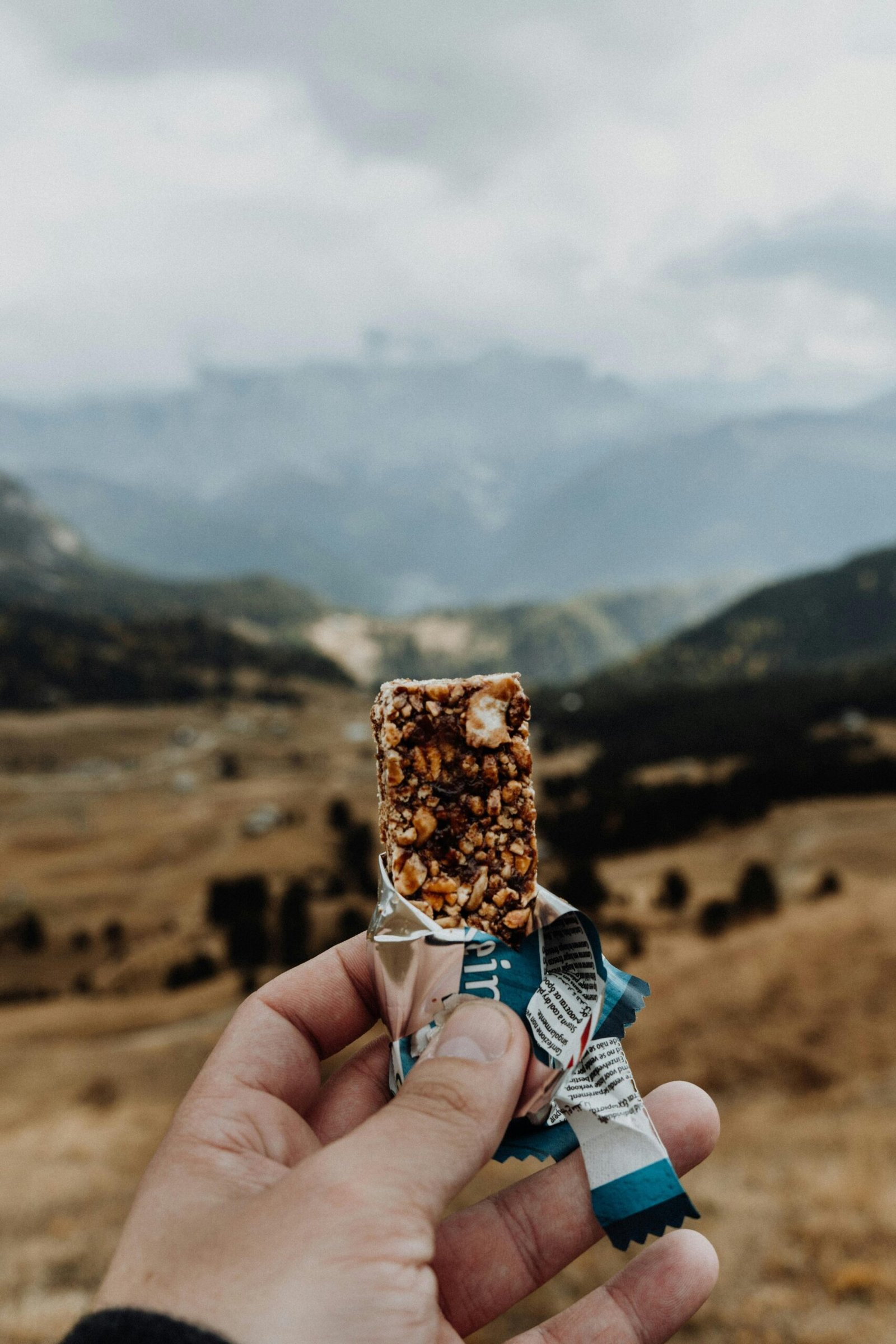Proper food when hiking can give you the nutrition you need to significantly impact both your energy levels and overall enjoyment of the trail. Many hikers underestimate the importance of food choices when planning their outdoor adventures, often focusing primarily on gear and route planning instead.

Selecting the right food for a hike requires balancing calories, pack weight, and nutritional value. You can’t eat ramen noodles forever. Most experienced hikers aim for options that provide 100-150 calories per ounce while also delivering adequate protein, fats, and complex carbohydrates to fuel sustained activity. When choosing food when hiking, you also want to avoid the foods that might cause you stomach issues. Elect to choose fully cooked items that don’t spoil easily.
You can’t eat ramen noodles forever.
Planning meals strategically helps hikers maintain energy throughout their journey without carrying excessive weight. Quick-access snacks in accessible pockets, lightweight lunches, and satisfying dinners that can be prepared with minimal equipment form the foundation of effective hiking nutrition.
1. Essential Food for Hiking

Proper nutrition during hikes maintains energy levels and enhances the outdoor experience. The right balance of nutrients can help hikers cover more ground with less fatigue and enjoy their adventure to the fullest.
High-Energy Snacks for the Trail
Trail mix remains the quintessential hiking snack, combining nuts, dried fruits, and sometimes chocolate for a perfect blend of proteins, fats, and sugars. This mixture provides quick energy and sustained fuel for challenging terrains.
Energy bars offer convenient, lightweight nutrition with balanced macronutrients. Look for options with at least 200 calories per bar and minimal processing for optimal trail performance.
Dried fruits like apricots, mangoes, and banana chips deliver natural sugars and potassium that help prevent muscle cramps. They’re lightweight and don’t require refrigeration, making them ideal for multi-day excursions.
Quick-energy options:
- Nut butters in portable pouches
- Beef or plant-based jerky (10+ grams of protein per serving)
- Honey sticks for immediate glucose
Nutritious Meal Options
Dehydrated meals have evolved significantly, now offering nutritionally complete options that require only hot water to prepare. Modern varieties provide 400-600 calories per serving with balanced protein and carbohydrates.
Instant oatmeal packets make excellent breakfast choices, particularly versions fortified with protein. They cook quickly with minimal fuel consumption and provide sustained energy for morning hikes.
Vacuum-sealed tuna or salmon pouches deliver essential omega-3 fatty acids and protein without the weight of canned alternatives. They pair excellently with quick-cooking grains like couscous or instant rice.
Wraps using tortillas stay fresh longer than bread and create less waste. Fill them with:
| Filling | Benefits |
|---|---|
| Hard cheese | Long-lasting protein source |
| Summer sausage | Calorie-dense, no refrigeration needed |
| Nut butters | Healthy fats and proteins |
| Granola Bar | Good carb source, long shelf life |
2. Hydration and Electrolyte Management
Water IS the most critical supply for hikers. With requirements ranging from 0.5 to 1 liter per hour of moderate activity depending on temperature and elevation. Portable filters or purification tablets ensure safe refills from natural sources.
Electrolyte tablets or powders prevent hyponatremia (dangerous sodium dilution) during extended exertion. They restore essential minerals lost through perspiration without the excess sugar found in sports drinks.
Popular Electrolyte packs are Liquid IV, Salt Sticks, Nuun tablets that you can add to your water bottle.
Coconut water packets provide natural electrolytes and potassium, helping prevent cramping during long treks. The mild flavor makes it easier to consume adequate fluids compared to plain water.
Consider salty snacks like pretzels or salted nuts to replace sodium lost through sweating. This simple addition helps maintain proper fluid balance and prevents dehydration headaches common during strenuous hikes.
Planning and Packing Food When Hiking

Proper food planning is essential for maintaining energy and enjoyment on hiking trips. The right preparation ensures hikers have adequate nutrition without carrying unnecessary weight or dealing with spoiled food on the trail.
Portion Control and Calorie Needs
Hikers generally require 2,500-4,500 calories per day depending on terrain difficulty, weather conditions, and individual metabolism. This represents significantly more energy than needed during normal daily activities.
Daily caloric requirements by activity level:
| Hiking Intensity | Calories Needed |
|---|---|
| Easy terrain | 2,000 – 2,500 |
| Moderate terrain | 3,000 – 3,500 |
| Difficult terrain | 3,500 – 4,000 |
Pre-measuring portions into daily ration bags helps prevent overpacking. Many hikers follow the 1.5 pounds of food per person per day rule as a starting guideline.
High-calorie density foods like nuts, dried fruits, and energy bars provide more nutrition per weight. Dehydrated meals offer substantial calorie content while minimizing pack weight.
3. Food Safety and Storage Tips
Proper food storage prevents foodborne illness and keeps wildlife away from campsites. Hard-sided containers or bear canisters are often required in many wilderness areas.
Food should be packed in airtight, waterproof containers to prevent moisture damage. Zip-top bags work well for organization and can be reused throughout a trip.
Perishable items require special consideration. Hard cheeses, cured meats, and some fruits can last several days without refrigeration if properly packed and kept out of direct sunlight.
Items that need refrigeration should be consumed on the first day. For multi-day trips, focus on shelf-stable options like dehydrated meals, dried foods, and canned goods with pull-tabs.
Eco-Friendly Food Choices
Food when hiking should be minimizing packaging waste reduces environmental impact on trails. Bulk foods stored in reusable containers significantly decrease the amount of trash carried out.
Sustainable packing options:
- Beeswax wraps instead of plastic wrap
- Silicone food storage bags rather than disposable options
- Metal or bamboo utensils in place of plastic versions
Pre-planning meals allows hikers to remove excess packaging at home. Transferring foods to reusable containers before the trip simplifies waste management on the trail.
Local and organic food options support sustainable agriculture and often taste better. Selecting items with biodegradable packaging or minimal wrapping helps protect the natural environment hikers come to enjoy.


